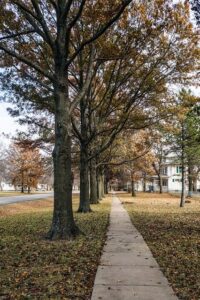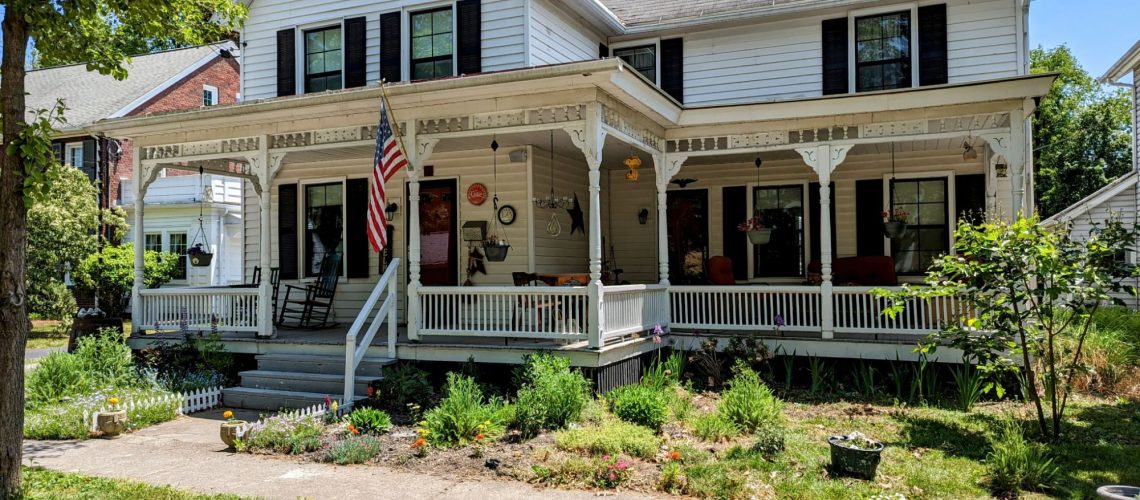As an Amazon Associate, I may earn from qualifying purchases at no cost to you. At www.retiregal.com, we’re committed to providing valuable solutions and therefore include carefully chosen affiliate products and services. Your support helps us continue offering quality content. We only recommend solutions we truly believe in.
My road to Small Towns With Front Porches…
After decades of living in the suburbs and bigger cities, it wasn’t until I retired to a quaint small town that I truly experienced the unbeatable joy and sense of community that I had always yearned for. From my very first day, I knew I was somewhere special.
I vividly remember unloading the moving truck into my “new” circa “1900” house, pondering what retirement had in store. Before very long, the first of many neighbors strolled by, noticed my husband and I near the door, and came on up to the porch to introduce herself. She asked if we needed any help getting settled.
We hadn’t realized it, but we had SO many questions about our new neighborhood and town! She seemed more than happy to help us out and before she left we had each others phone numbers and I had an invitation to the bible study down the street! That was back in 2019 and we have become good friends over the years.
Her simple, welcoming gesture of offering and giving help made me feel instantly at home in a way the hustle of my prior life never did.
The Front Porch: A Community Anchor
In small towns with front porches, the porch itself becomes an anchor for casual conversations and connections. As folks stroll by walking dogs, on their way to grabbing coffee, or just enjoying the fresh air, you’ll inevitably end up waving hello and chatting. In the years I’ve been here, countless people have passed by my porch, and I’ve learned that if I’m in the mood for chatting, all I need to do is say something, such as “how’s the walk going today”.

The impromptu moments of connection and getting to know the neighbors are what make porch life so special and such a draw for retirees. Unlike suburbs where you’re isolated from community, or cities where everyone rushes by without a second glance, small towns just have a way of encouraging you to slow down, take it all in, and actually engage with people and your surroundings.
The Unexpected Health Perks of Walkability in Small Towns With Front Porches
Another fantastic perk of small towns with front porches is the supreme walkability factor. Unlike sprawling suburbs designed entirely around cars, these close-knit communities are made for pedestrians. I can easily walk to the coffee shop, library, restaurants, shops, parks, my church – you name it. And the best part is running into those ever-familiar smiling faces all along the way.

Living in a walkable neighborhood offers significant benefits for both physical and mental health. Here are some key points to ponder, supported by recent studies:
Physical Health Benefits:
- Increased Physical Activity: Walkable neighborhoods encourage residents to incorporate more physical activity into their daily routines. This increased activity can help reduce obesity and related health issues like diabetes and cardiovascular disease.
- Lower Obesity Rates: Research shows residents in more walkable neighborhoods have lower rates of obesity and diabetes. For instance, people living in New York City walk significantly more and weigh less on average than those in less walkable areas.
Mental Health Benefits:
- Reduced Stress and Anxiety: Physical activity like walking is linked to improved mental health, including reduced stress, anxiety, and depression. Walking itself can be meditative, offering personal reflection and stress relief.
- Social Interaction and Community Engagement: Walkable areas foster community by encouraging social interactions. Regular chats with neighbors while out walking leads to stronger social ties, reducing loneliness and isolation.
There are broader benefits too, like reduced carbon emissions from less driving, contributing to better air quality and a healthier environment overall. Some walkable neighborhoods tend to have higher property values and more local business growth too.
For us retirees with more free time on our hands, that walkability factor is huge. Instead of being stuck at home, I can easily walk to the coffee shop and strike up a conversation with the friendly barista. Or head to the library and join one of the regular groups for a morning exercise hour or a book club meeting. Having that built-in exercise and social interaction quite literally at your doorstep is incredibly valuable.
What If You’re Unable to Walk Far?
My neighbor Jane’s legs aren’t as cooperative as one would hope these days, but she has about a dozen people she can call on to get a ride to church, the store, or doctor’s appointments. Every one of her neighbors knows her situation and are very willing to help her when her family isn’t able to. That’s the beauty of a small town – people get to know each other, and they inevitably actually CARE about you!
Access to Healthcare
One important consideration when looking into small towns, especially for retirees, is proximity and ease of access to quality healthcare facilities. If you ever do make the decision to move to a small town you’ll want to ensure there is a hospital or medical center within a comfortable distance in case any future needs arise as you age in place. (For more on preparing your home for growing old there, be sure to check out my article “Smart Home Technology for Aging in Place“.)
Combating Loneliness Through Community Connections
Thinking of social interaction, having an active social circle is absolutely vital for our wellbeing and quality of life as retirees. For those of you with kids, this is about the time they really start getting immersed in careers and families of their own. It’s only natural for our personal social connections with them to dwindle a bit over time. It doesn’t mean your kids love you any less, but the time they can devote to you may not be what you’ve been accustomed to in the past. The possibility of becoming lonely in your retirement years looms.

That’s where small towns with front porches really shine. You’re constantly surrounded by opportunities to engage through local clubs, volunteer organizations, community events, or simply chatting with neighbors out on their porches. Research has consistently shown that social integration significantly impacts mortality risk (in a good way!):
Impact on Our Life Span:
- Increased Survival Likelihood: Strong social relationships are associated with a 50% increased likelihood of survival.
- Different Social Relationship Measures: Complex measures of social integration showed the strongest link to reduced mortality risk, more so than simpler measures like living alone.
Moderating Factors:
- The Same for All Walks of Life: The protective effects were consistent regardless of age, sex, health status, and follow-up period, showing broad applicability.
Additional Evidence:
- Broader Health Impacts: Social relationships predict overall health outcomes, rivaling major risk factors like smoking and obesity. Both structural and functional aspects contribute to health and longevity.
For those who have experienced things like becoming widowed or having a working spouse, small town communities can help provide an important social outlet to combat isolation and loneliness. I’ve seen it firsthand with neighbors who were newly widowed or just new to town – they were swiftly embraced and folded into the community through church groups, hobby clubs, senior centers, you name it.
Considering Your Ideal Retirement Living Situation
Of course, living in small towns with front porches isn’t the ideal fit for everyone. Some retirees may crave the vibrant cultural amenities, dining, and entertainment options of a bigger city. Others may want something even more low-key than a small town, like a rural farmhouse or cottage tucked away in the countryside. The perfect retirement living situation is highly personal.
If an active, socially engaged lifestyle being face to face with people is your top priority, then small towns with front porches really can’t be beaten. But I know others who prefer the convenience and low-maintenance vibe of a condo or townhome community. While still providing that sense of community, these types of neighborhoods allow you to have your own space while still being able to easily engage with neighbors through community centers, clubs, and events when you wish.

The key is carefully considering your unique personality, needs, and desires for retirement. Do you crave a quiet, simple life? Or an active social calendar? Are you okay with yard work and maintenance or would you prefer a lock-and-leave lifestyle? Getting clear on your priorities can help narrow down that ideal living situation.
Safety Considerations in Small Towns With Front Porches
Lower crime rates are often associated with small town living, which can provide an added sense of security and peace of mind. My husband and I travel to warm climates every winter (see Being a Snowbird in Retirement – Tips from 5 Years of the Snowbird Lifestyle) and let me tell you how wonderful it is that our neighbors very willingly look out for our home and check in to let us know if anything is amiss.
Once, while we were in Florida, one of our children needed something from our house. They came and got it, then accidentally left our back door wide open – unbeknownst to any of us! A few days later, our next-door neighbor called to let us know. Suffice to say, he saved us from an outrageous heating bill that winter!
I’m embarrassed to admit this, but my husband and I have traveled out of state and left our front door open for the weekend. Not just once, but TWICE! It’s highly unlikely anyone would risk entering our house uninvited – all the neighbors know each other, and you just don’t worry about things like that in a small town.
While no place is completely immune to safety concerns, the closeness of a small community means more eyes on the street and neighbors looking out for one another.
Finding Your Own Small Town Heaven
 For me personally, the decision to retire to a small towns with front porches was one of the most rewarding and happiest choices I’ve ever made. As I sit out on my porch, waving to the familiar friendly faces that pass by each day, I’m filled with gratitude for finding this vibrant community that has embraced me wholeheartedly.
For me personally, the decision to retire to a small towns with front porches was one of the most rewarding and happiest choices I’ve ever made. As I sit out on my porch, waving to the familiar friendly faces that pass by each day, I’m filled with gratitude for finding this vibrant community that has embraced me wholeheartedly.
The connections I’ve made, the impromptu conversations, the feeling of truly knowing and being known by my neighbors – it’s brought me a level of contentment and sense of belonging that I hadn’t experienced since my college days, living in an all girl dormitory. I only wish I’d followed the dream of small town living sooner!
If you’re looking for that engaged, connected lifestyle where you’re truly part of a community, I can’t recommend enough exploring small towns with front porches. You might just discover your own slice of retirement magic there too.
Don’t forget to subscribe for more articles on making the most of your retirement years! And let me know your thoughts or experiences with small town living in the comments below. I’m always eager to hear different perspectives.
I’d also recommend checking out my previous posts “Being a Snowbird in Retirement – Tips from 5 Years of the Snowbird Lifestyle“, “Smart Home Technology for Aging in Place“, and “Where to Live After Retirement – Don’t Skip Reading This!” for more insights on finding the perfect retirement haven and “rightsizing” your living situation.
References
Holt-Lunstad, J., Smith, T. B., & Layton, J. B. (2010). Social relationships and mortality risk: A meta-analytic review. PLoS Medicine, 7(7), e1000316. https://doi.org/10.1371/journal.pmed.1000316
Frontiers. (2021). Social support and longevity: Meta-analysis-based evidence and psychobiological mechanisms. Frontiers in Psychology. Retrieved from https://www.frontiersin.org/journals/psychology/articles/10.3389/fpsyg.2021.717164/fulls













